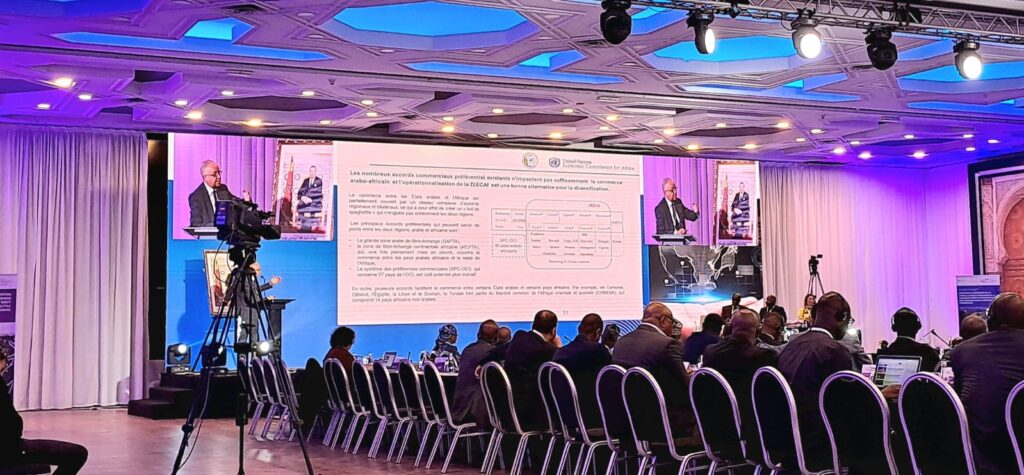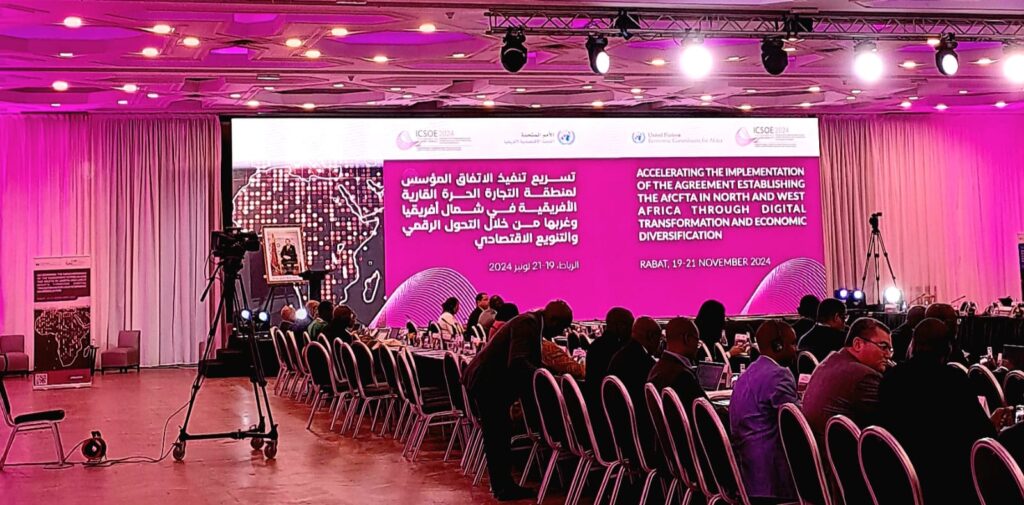CAFRAD participated in the conference on accelerating the implementation of the AfCFTA in the North and West of Africa through digital transformation and economic diversification, organized by the Intergovernmental Committee of Senior Officials and Experts (CIHFE) of North and West Africa in Rabat, from November 19 to 21, 2024

The Director General of CAFRAD, Dr. C. Dieudonné ASSOUVI, and the Communications Manager, Ms. Basma BOUZIANI, participated in the conference on accelerating the implementation of the AfCFTA in North and West Africa via digital transformation and economic diversification, organized by ICSOE in Rabat, from November 19 to 21, 2024.
The thirty-ninth edition of the intergovernmental committee of senior officials and experts from the northern and western regions of Africa was centered on the issue of accelerating the implementation of the AfCFTA (African Continental Free Trade Area) in the North and West of Africa, with the digital transformation and economic diversification at the center of the reflection.
The goal of this meeting was to debate on public policies for the implementation of digital connectivity, one of the transition points for the implementation of the Sustainable Development Goals (SDGs), which will be one of the main drivers of accelerating the implementation of the AfCFTA. The debaters recognized the importance of current issues in Africa: in the areas of health, social and economic development, food security, geopolitical instability and climate change.
The closing session was an opportunity to take stock of the important elements of the organized plenaries. The emphasis was placed on three words: People, Planet, Prosperity, or the importance of supporting economic and social evolution while protecting the planet, human rights, equity and social inclusion, intergenerational and intra-generational solidarity. Based on the concept of “one Health”, we need to reconcile the economy and ecology. We are talking in particular about new concepts such as “inclusive development”, where civil society and the private sector must form a harmonious whole to ensure that all stakeholders participate in the development project. A systemic, integrated and holistic approach is essential today for thinking about sustainable development priorities.
Another important point is to train state governments to align with the six key transitions, catalysts of the SDGs, which are: food systems, access to energy and its affordability, digital connectivity, education, employment and social protection, and finally climate change, loss of biodiversity and pollution. There is no single model for implementing these key transitions. It will therefore be necessary to personalize the implementation approach according to the country with a multi-actor and multinational partnership perspective. Aligning strategic actions with the components of the SDGs will enable a better implementation.

In addition, experts advise African states to develop a plan or a comprehensive prevention policy to prepare for shocks, learn resilience, and plan economic interventions (ecological planning), in view of the many issues concerning eopolitical insecurity. From this perspective, beyond building resilience, African states are called upon to reduce their dependence on others in terms of food and nutritional security, and consider investing in key sectors, such as agriculture, to gain self-sufficiency. By investing in sustainable development, States will gain resilience to exogenous shocks.
Investments leading to transformational changes are important today, and should be prioritized by States. They can use debts, or even diaspora savings, to invest in the well-being of citizens. In this sense, countries are called upon to develop partnerships and reduce tariff and non-tariff barriers. Facilitating market access for investors involves eliminating or reducing barriers, as well as sharing information to mobilize investment funds. The information concerns the most important regional value chains (automobile, food, pharmaceutical products, etc.), on which States can build their sustainable public policies. When investing, it is also important to think about diversification. The example of a few countries cited which have sustained growth in the manufacturing sector, and which have diversified their investments in services linked to finance, businesses and digitalization.
Furthermore, a good strategic policy involves the inclusion of small and medium-sized enterprises (SMEs), women, young people and people with specific needs.
The question of investments from Gulf countries was also raised: the mobilization of funds from this region is all the easier as the proximity is already pre-established thanks to North Africa (Arab League).
Ultimately, the western and northern regions of Africa are affected by synchronic shocks, including geopolitical conflicts and socio-political instability, social and food insecurity, or even the climate challenge and shortage of water; which greatly hampers economic and social development projects. In addition, the insufficiency of financial resources and the increase in public debt prevent the implementation of integrated policies; which means that the challenge for the States of these two (2) regions is to find innovative financing to address complex and interdependent challenges. Key reflection points such as the mobilization of national resources, or even investments from the diaspora were explored during the conference workshops.
Summary of the debates
- Diversification of the economy is a major issue to reduce dependence on raw materials;
- Importance of the inclusion of women and young people and of VSEs, startups: entrepreneurship policies;
- Strengthening infrastructures and working on regional connectivity;
- Digital transformation: driver of simplification, transformation, and inclusion;
- Unexploited opportunities between Arab and African countries: targeted actions, targeted investments especially in infrastructure;
- Gender and youth dimensions are transversal in all policies;
- Industrial policies and youth policies: digital transformation policy to accelerate value chains;
- Innovation, research and development;
- Rise in cooperation between sectors;
- Support for SMEs: policy + strengthen and systematize support for SMEs for young people and women;
- Digitization: short-cuts to catch growth points very quickly;
- Establishment of regional value chains: interest which is registered (north: implementation, e-mobility, complementary value chains, green value chain) in all member countries;
- Approach: identify complementarities to work together: governance together, ownership by countries and stakeholders;
- Appropriation of the private sector to bring value chains to life before institutionalizing them.




